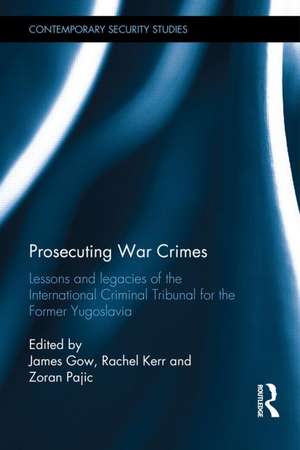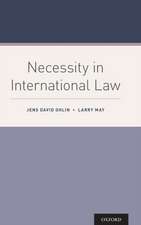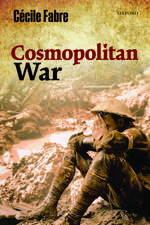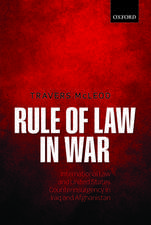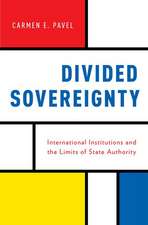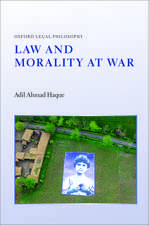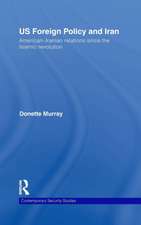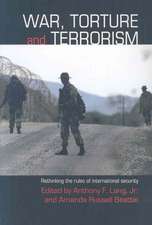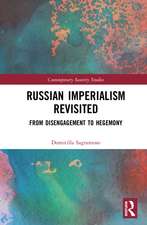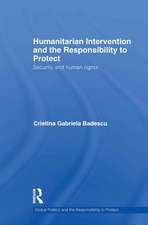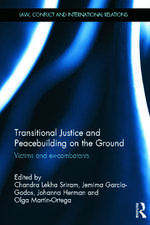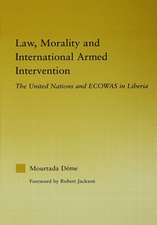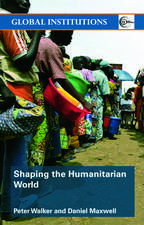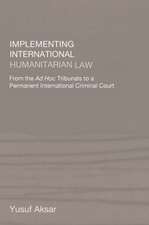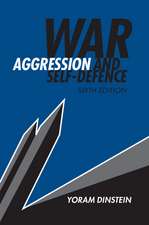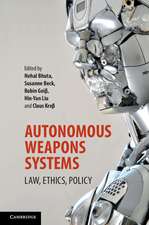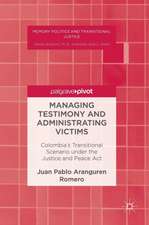Prosecuting War Crimes: Lessons and legacies of the International Criminal Tribunal for the former Yugoslavia: Contemporary Security Studies
Editat de James Gow, Rachel Kerr, Zoran Pajicen Limba Engleză Hardback – 22 aug 2013
As the ICTY has now entered its twentieth year, this volume reflects on the record and practices of the Tribunal. Since it was established, it has had enormous impact on the procedural, jurisprudential and institutional development of international criminal law, as well as the international criminal justice project. This will be its international legacy, but its legacy in the region where the crimes under its jurisdiction took place is less clear; research has shown that reactions to the ICTY have been mixed among the communities most affected by its work. Bringing together a range of key thinkers in the field, Prosecuting War Crimes explores these findings and discusses why many feel that the ICTY has failed to fully engage with people’s experiences and meet their expectations.
This book will be of much interest to students of war crimes, international criminal law, Central and East European politics, human rights, and peace and conflict studies.
Din seria Contemporary Security Studies
-
 Preț: 312.00 lei
Preț: 312.00 lei -
 Preț: 348.40 lei
Preț: 348.40 lei - 9%
 Preț: 934.96 lei
Preț: 934.96 lei -
 Preț: 287.96 lei
Preț: 287.96 lei - 18%
 Preț: 1222.16 lei
Preț: 1222.16 lei - 18%
 Preț: 1227.03 lei
Preț: 1227.03 lei -
 Preț: 452.35 lei
Preț: 452.35 lei - 18%
 Preț: 1108.42 lei
Preț: 1108.42 lei - 20%
 Preț: 248.97 lei
Preț: 248.97 lei - 18%
 Preț: 1218.89 lei
Preț: 1218.89 lei - 18%
 Preț: 1058.79 lei
Preț: 1058.79 lei -
 Preț: 498.48 lei
Preț: 498.48 lei - 28%
 Preț: 1016.77 lei
Preț: 1016.77 lei - 18%
 Preț: 1062.98 lei
Preț: 1062.98 lei - 18%
 Preț: 1010.05 lei
Preț: 1010.05 lei - 18%
 Preț: 1054.97 lei
Preț: 1054.97 lei -
 Preț: 399.79 lei
Preț: 399.79 lei - 18%
 Preț: 1114.30 lei
Preț: 1114.30 lei - 18%
 Preț: 1113.25 lei
Preț: 1113.25 lei - 18%
 Preț: 1221.26 lei
Preț: 1221.26 lei - 18%
 Preț: 1059.84 lei
Preț: 1059.84 lei - 18%
 Preț: 704.41 lei
Preț: 704.41 lei - 18%
 Preț: 1055.84 lei
Preț: 1055.84 lei - 28%
 Preț: 821.10 lei
Preț: 821.10 lei - 18%
 Preț: 1061.06 lei
Preț: 1061.06 lei - 18%
 Preț: 1229.46 lei
Preț: 1229.46 lei -
 Preț: 385.54 lei
Preț: 385.54 lei - 18%
 Preț: 946.61 lei
Preț: 946.61 lei - 18%
 Preț: 1271.75 lei
Preț: 1271.75 lei - 18%
 Preț: 1057.57 lei
Preț: 1057.57 lei -
 Preț: 416.22 lei
Preț: 416.22 lei -
 Preț: 437.71 lei
Preț: 437.71 lei - 18%
 Preț: 1054.71 lei
Preț: 1054.71 lei -
 Preț: 409.31 lei
Preț: 409.31 lei - 18%
 Preț: 1170.14 lei
Preț: 1170.14 lei - 28%
 Preț: 849.84 lei
Preț: 849.84 lei - 18%
 Preț: 702.40 lei
Preț: 702.40 lei -
 Preț: 414.32 lei
Preț: 414.32 lei - 18%
 Preț: 1059.93 lei
Preț: 1059.93 lei - 18%
 Preț: 1061.93 lei
Preț: 1061.93 lei - 18%
 Preț: 1163.88 lei
Preț: 1163.88 lei - 18%
 Preț: 1002.68 lei
Preț: 1002.68 lei - 18%
 Preț: 694.94 lei
Preț: 694.94 lei - 25%
 Preț: 823.63 lei
Preț: 823.63 lei - 18%
 Preț: 939.79 lei
Preț: 939.79 lei - 18%
 Preț: 1057.89 lei
Preț: 1057.89 lei
Preț: 848.98 lei
Preț vechi: 1178.89 lei
-28% Nou
Puncte Express: 1273
Preț estimativ în valută:
162.50€ • 176.57$ • 136.59£
162.50€ • 176.57$ • 136.59£
Carte tipărită la comandă
Livrare economică 21 aprilie-05 mai
Preluare comenzi: 021 569.72.76
Specificații
ISBN-13: 9780415827997
ISBN-10: 041582799X
Pagini: 264
Dimensiuni: 156 x 234 x 20 mm
Greutate: 0.52 kg
Ediția:New.
Editura: Taylor & Francis
Colecția Routledge
Seria Contemporary Security Studies
Locul publicării:Oxford, United Kingdom
ISBN-10: 041582799X
Pagini: 264
Dimensiuni: 156 x 234 x 20 mm
Greutate: 0.52 kg
Ediția:New.
Editura: Taylor & Francis
Colecția Routledge
Seria Contemporary Security Studies
Locul publicării:Oxford, United Kingdom
Public țintă
Postgraduate, Professional, and UndergraduateCuprins
1. Introduction: Trials and Tribulations at the ICTY, James Gow and Rachel Kerr 2. The Strategic Purpose of the ICTY and International Peace and Security, Madoka Futamura and James Gow 3. Prosecuting with Pictures: Two Decades of Experience and Evolution, James Gow and Milena Michalski 4. International Law and Institutional Legacy: Prosecuting those accused of breaching the legal bounds of war, Catherine Adams 5. Historical Record and the Legacy of the ICTY, Madiha Khan 6. Lost in translation? Perceptions of the ICTY in the Former Yugoslavia, Rachel Kerr 7. Beyond The Hague: Prosecuting war crimes in Bosnia and Herzegovina, Olga Martin-Ortega 8. The Culture of Denial in Bosanska Krajina, Haris Subašić and Nerzuk Ćurak 9. Judging Their Hero: Perceptions of the International Criminal Tribunal for the former Yugoslavia in Croatia, Iva Vukušić 10. Revisionism, Denial and anti-ICTY Discourse in Serbia’s Public Sphere: Beyond the ‘Divided Society’ Debate, Jelena Obradović-Wochnik 11. International Justice and Kosovo, Ernst Dijxhoorn 12. Reflections on the Lessons and Legacies of the ICTY: Rethinking Reconciliation in the Context of Transitional Justice, Zoran Pajić
Notă biografică
James Gow is Professor of International Peace and Security at King's College London. He is the author of several books, including War, Image and Legitimacy (2007, with Milena Michalski).
Rachel Kerr is Senior Lecturer in War Studies at King's College London and the author/editor of three books.
Zoran Pajic is Visiting Professor in the Department of War Studies at King's College London.
Rachel Kerr is Senior Lecturer in War Studies at King's College London and the author/editor of three books.
Zoran Pajic is Visiting Professor in the Department of War Studies at King's College London.
Recenzii
'Prosecuting War Crimes not only fills a number of gaps in the existing academic literature on the Yugoslav tribunal, in particular, and international criminal law, in general, its quality and cohesiveness raise the standard of excellence that future research will be hard-pressed to reach.' -- Jeffrey S. Morton, Slavic & East European Review
Descriere
This volume brings together a range of viewpoints and approaches to the question of what International Criminal Tribunal for the former Yugoslavia’s legacy will and should be.
